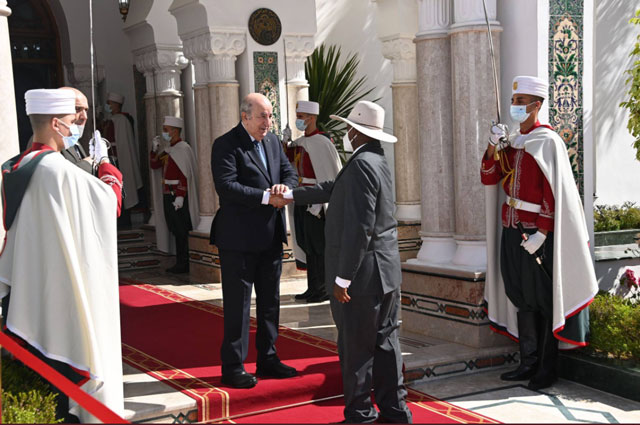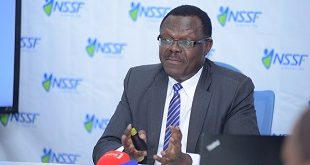
Algiers, Algeria | THE INDEPENDENT & URN | Algeria’s leader Abdelmadjid Tebboune has held talks with Uganda’s President Yoweri Museveni, who is on a three day visit to the north African country.
The talks are said to have covered several areas of mutual interest, as Algeria reportedly plans to spend $1 billion on development projects across Africa. Building and funding a refinery as Uganda gears for first oil in 2025, was among the top issues discussed.
“We are looking at Algeria investing in our refinery. We want to build an inland refinery. It is absolutely necessary because it will cut transport costs seeing that we are far away from the coast,” Museveni said after the talks.
He said they discussed issues on growing the prosperity of Africa and agreed to work together in the areas of trade, energy, education, agriculture and counter-terrorism where they have experience in this, just like Uganda.
“In Algeria we have reliable partners : we are looking at powdered milk which is already coming here, coffee, tea and then products from Algeria of petroleum and petrochemicals.”
The two countries signed two memoranda of understanding in the field of energy, as well as agreements in the sectors of agriculture, tourism, and trade, Algeria’s state-owned news agency APS reported.
Earlier in the day, the two presidents met to discuss “a number of issues of common interest, in addition to ways of coordinating positions aiming at supporting just causes in African and international arenas,” the APS reported.
Tebboune announced during the meeting that 150 Algerian businessmen will travel to Uganda’s capital Kampala to discuss potential partnerships with Ugandan companies, in an effort to strengthen bilateral relations.
UNOC has signed an MOU with Sonatrach, the oil company of Algeria.
The MOU covers oil and gas cooperation-Upstream, Midstream (refining and petrochemicals), Downstream, capacity building, and Oil & Gas Services.
GM Uganda Refinery Holding Company @mmugerwa signed for 🇺🇬. pic.twitter.com/0KEW0ruKRh
— UNOC (@UNOC_UG) March 12, 2023
Several Ministers including those from the Trade, Agriculture, Energy, Mineral Development, and Education and Sports sectors are part of the delegation. Frank Tumwebaze, the Minister of Agriculture, Animal Industry Fisheries says that he hopes the deal to export milk to the North African country will be concluded.
Following his meeting with Algerian Ambassador in Kampala, Cherif Qualid in November last year, President Museveni said the country had shown interest in buying Ugandan milk worth 500 million dollars (1.85 trillion Shillings). “Therefore, the Joint Ministerial Council should make plans to complete the signing of all necessary documents with Algeria, ” he directed.
The Dairy Development Authority says that in addition to milk powder, Uganda will be exporting other dairy products, having completed a technical verification of the dairy value chain regulatory framework by the Algerian team in December 2022.
On whether Uganda has the capacity to supply such quantities, DDA says Uganda now produces 3.2 billion liters of milk annually, with just over three quarters put onto the market. Uganda earned 3.8 trillion Shillings (US$1 billion) from raw milk production in 2021/2022. This was an improvement from the 3.01 trillion in the previous year.
Samson Akankiza, the Acting Managing Director says dairy exports bounced back to 102.6 million dollars last year from US$92.4 million recorded in the year 2020/21. The exports are yet to reach the 2018 US$130 million levels.
“Algeria’s milk production is generally low and most of their milk products are being imported from other countries. Uganda has quality milk which is organically produced meaning we shall have the best product on the market,” Akankiza said.
Uganda imported milk worth US$4.2 million. “The Joint Permanent Commission and business-to-business meetings between the two countries in Algiers will see some deals being signed off,” he said. This would come as a relief to milk producers and exporters who have over the years suffered hiccups and uncertainties in the regional market.
Kenya, the biggest market, intermittently bans or restricts Ugandan dairy products and a week ago, the Dairy Board announced that it was stopping the importation of milk powder ahead of an expected increased production in the country. For three years, Uganda’s exports to Rwanda have been almost nil, since the border closure in February 2019, having fetched 52 billion Shillings (US$14 million dollars), a year before.
The hope for a stable market has been in the pacification of the Democratic Republic of Congo and South Sudan.
*****
RELATED STORY
 The Independent Uganda: You get the Truth we Pay the Price
The Independent Uganda: You get the Truth we Pay the Price



